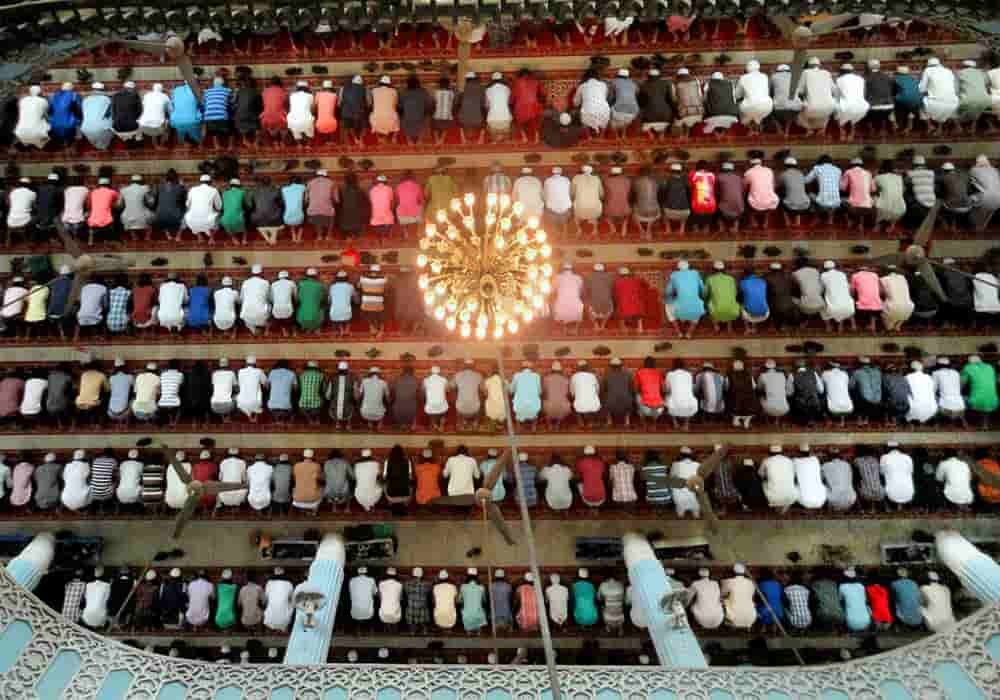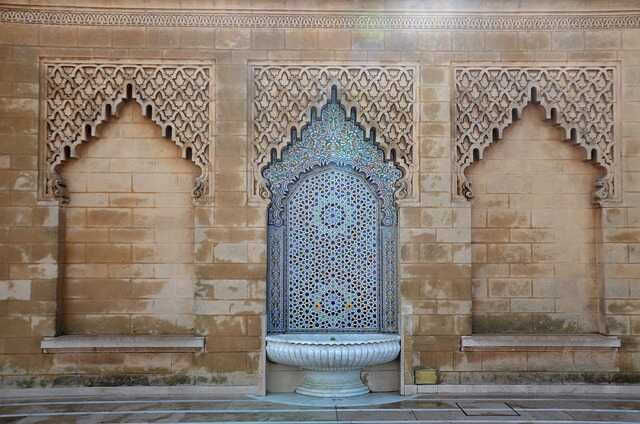Islam Prayer Times (Salah)
Islam prayers times are prescriptions at specific times. It is not possible to pray ad-dhouhr, al maghrib and al fajr before their respective times. In the case of twinning (al jam ‘), it is permissible for the Muslim to pray to al’ asr and al ‘isha before their hours. The prayer times allow you to respect these conditions. Salât (in Arabic: صلاة [ṣalāʰ] pl. صلوات [ṣalawāt]) or namaz (Persian: نماز) refers to Islamic prayer, the second of the five pillars of Islam. This term however covers a large set of prayers in Islam, but it is also used specifically for the five daily ritual prayers, obligatory for the faithful. These are therefore prayers that can be qualified as canonical, as opposed to supererogatory prayers.
It is the daily ritual prayer in the direction of Mecca (location of the Kaaba), the Qibla, which is to be performed at fixed times (awqāt) five times a day. The Sufis consider the Salāt to be the greatest Dhikr.
Salah Times (Islam Prayer Times) Fajr, Zuhr, Asr, Maghrib, Isha, Jumu’ah
Fajr
Begins at dawn, may be performed up to sunrise after Fajr nafl prayer
Zuhr
From when the sun has passed the zenith, may be performed up to the time of Asr.
Asr
From when the shadow cast by an object is twice its length, may be performed up to the time of Maghrib.[t 6][t 7]
Maghrib
From sunset, may be performed up to the end of dusk.
Isha
Begins with the night, may be performed up to dawn.
Jumu’ah
From when the sun has passed the zenith, may be performed up to the time of Asr, on Fridays.
| Compulsory (fard) prayer | Prescribed time | Voluntary before fard | Obligatory | Voluntary after fard | Total | The prescribed times of the prayers depicted in place of the position of the sun in the sky, relative to the worshipper. | ||||
|---|---|---|---|---|---|---|---|---|---|---|
| Sunni | Shia | Sunni | Shia | Sunni | Shia | Sunni | Shia | |||
| Fajr | Begins at dawn, may be performed up to sunrise after Fajr nafl prayer | 2 rakat¤ | 2 rakat | 2 rakat | None | 2 rakat | 4 r. | 6 r. | ||
| Zuhr | From when the sun has passed the zenith, may be performed up to the time of Asr. | 4 rakat¤ | 4 rakat | 4 rakat | 2 rakat | 8 r. | 10 r. | 16 r. | ||
| Asr | From when the shadow cast by an object is twice its length, may be performed up to the time of Maghrib. | 4 rakat‡ | 4 rakat | 4 rakat | None | 8 r. | 8 r. | 16 r. | ||
| Maghrib | From sunset, may be performed up to the end of dusk. | 2 rakat | 3 rakat | 3 rakat | 2 rakat | 2 r. | 7 r. | 11 r. | ||
| Isha | Begins with the night, may be performed up to dawn. | 4 rakat‡ | 4 rakat | 7 r.× | 4 r. | 2 rakat | 2 r. | 13 r. | 10 r. | |
| Jumu’ah | From when the sun has passed the zenith, may be performed up to the time of Asr, on Fridays. | 4 rakat‡ | 2 rakat | 2 rakat with khutbah | 4 rakat2 rakat 2 r. nafl | 2 rakat | 14 r. | 6 r. | ||
| ¤: denotes sunnah mu’akkadah (verified sunnah), which must be offered by adherents of the Hanafi madhhab.‡: denotes sunnah ghair-mu’akkadah (unverified sunnah). ×: offered as two prayers of 4 and 3 rakat each, with the 3 rakat considered wajib and performed after the 4 fard rakat. | ||||||||||
The five canonical prayers take place at dawn (Fajr), in the middle of the day, when the sun is at its zenith (Dhuhr), in the middle of the afternoon (‘Asr), at dusk (Maghreb) and in the evening (‘Isha’). Each of them is made up of a variable number of rakʿah (Arabic: ركعة, pl. ركعات), which can be called prayer units.
Salah Times (Islam Prayer Times) in Washington DC
Widget not in any sidebars
Hadith on prayer times
Abdullah Ibn Amr reports that the Prophet (sallallahou ‘alayhi wa sallam) said: “The time of ad-dhouhr begins when the sun goes down, and continues until a man’s shadow is equal to his height ( beginning of al ‘asr). The time of al ‘asr lasts until the sun turns yellow. The time of al Maghrib is prolonged until the disappearance of the twilight. Al ‘isha time lasts until halfway through the night. The time of al soubh is between dawn and sunrise. “[Muslim]
Prayer according to the Quran
The term salat is used 65 times in the Quran. Salat can designate the canonical and obligatory prayer, distinguished from other prayers such as the prayer of request (du’â) or certain litanic prayers. It is also used to designate any prayer made for God, without precision. The term is sometimes used in the plural and then designates prayers calling for divine blessings. Thus, the term salat cannot designate the canonical prayer in suras II and IX.
According to the Koran, from the origins of mankind, prayer has been revealed and practiced by the prophets, “as a practice of worshiping God”. It would belong to an original monotheism, associated with Abraham and designated under the term of hanifism. Before being a standardized form, prayer is, in the Koran, the basis of religious behavior.
In the Koran, evocations of canonical prayer are absent in the oldest suras. It is mainly found in the suras of the Medinan period, without the Koran providing all the information and rules of prayer. These were supplemented by the Muslim tradition.
Amar Makruf Nahi Mungkar: Promoting Goodness and Forbidding Evil in Islam
Prayer
Each of the five prayers is divided into two or three or four units called rak’a (plural: rakat). Each of these cycles is itself made up at least of the recitation of Sura Al-Fatiha, of divine praise, of invocations, all in a specific series of postures: standing, inclined, prostrate, kneeling.
At the end of each prayer, the Muslim says twice, turning his face to the people to his right and then to his left: “May the peace and mercy of God be upon you” (in Arabic: السلام عليكم ورحمة الله (as -salam alay-kum wa-raḥmatu-l-lah) This formula is called taslim (greeting).
The midday prayer, Salat Dhuhr, and the afternoon prayer, Salat Asr, are each composed of four rakat, divided into two pairs interspersed with a kneeling station.
The twilight (dusk) prayer, Salat Maghrib, is made up of three rakat separated by a kneeling station. The first two are recited aloud.
Finally, the night prayer, Salat Icha, consists of two pairs of rakat, separated by a sitting station. Again, the first two are recited aloud.
Sources: PinterPandai, BBC, Learn Religions
Photo credit: Wikimedia Commons
Photo explanations: Muslims praying in a Mosque in Bangladesh.
Amar Makruf Nahi Mungkar: Promoting Goodness and Forbidding Evil in Islam



